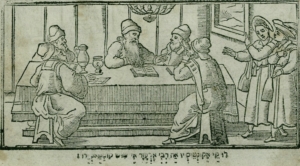⤷ You are here:
🖖︎ Prayers & Praxes —⟶ Praxes —⟶ Counting Days 🡄 (Previous category) :: 📁 Entering Sacred Spaces 📁 Phonaesthetics :: (Next Category) 🡆 Sorted Chronologically (old to new). Sort most recent first? Each day between the beginning of Passover and Shavuot gets counted, 49 days in all, 7 weeks of seven days. That makes the omer period a miniature version of the Shmitah and Yovel (Jubilee) cycle of 7 cycles of seven years. Just as that cycle is one of resetting society’s clock to align ourselves with freedom and with the needs of the land, this cycle too is a chance to align ourselves with the rhythms of spring and the spiritual freedom represented by the Torah. . . . Categories: Tags: apprehension, barley, counting, eco-conscious, ecoḥasid, growing, growth, neo-lurianic, ספירת העומר sefirat haomer, ספירות sefirot, trepidation, watchfulness, wheat Contributor(s): Scene: the Technion Institute, midnight. A physics graduate student accidentally opens a portal to another timeline. The portal remains open just long enough for someone on the other side to pass a siddur through. Mostly the siddur looks very familiar, but there are a few things odd about it. The following is the first of several uploads the editor is planning that reflect this parallel universe, wherein all Judaism is conducted according to the rabbinic norms of our universe, except for two things. Firstly, the festivals of wine-offering and wood-offering as described in the Temple Scroll of Qumran were included as part of scripture. And secondly, the custom of writing the Tetragrammaton in Paleo-Hebrew is preserved. Anyway, this is a count of the fifty days after Shavuot, in which the new wine is gathered from the tribes of Israel to the Temple. Apparently there were four different kinds of wine delivered, but we don’t know what they are. Let’s just say red and white, mevushal and non-mevushal. . . . Categories: Tags: 21st century C.E., 58th century A.M., alternate timeline, counting, Dead Sea Scrolls, wine-offering festival Contributor(s): Scene: the Technion Institute, midnight. A physics graduate student accidentally opens a portal to another timeline. The portal remains open just long enough for someone on the other side to pass a siddur through. Mostly the siddur looks very familiar, but there are a few things odd about it. The following is the first of several uploads the editor is planning that reflect this parallel universe, wherein all Judaism is conducted according to the rabbinic norms of our universe, except for two things. Firstly, the festivals of wine-offering and wood-offering as described in the Temple Scroll of Qumran were included as part of scripture. And secondly, the custom of writing the Tetragrammaton in Paleo-Hebrew is preserved. Anyway this is a count of the fifty days after the wine-offering festival, in which the new oil is gathered from the tribes of Israel to the Temple. The instructions say only half a hin of oil per tribe, which suggests that by “tribe” something more akin to “family group” is meant, since a total of six hin wouldn’t be enough for the Temple to function. . . . Categories: Tags: 21st century C.E., 58th century A.M., alternate timeline, counting, Dead Sea Scrolls, oil-offering festival, olive oil Contributor(s): A liturgy for counting the fifty days of consolation or comfort between Tishah b’Av and Rosh haShanah (non-inclusive), in the style of the liturgy for the omer. . . . Categories: Tags: Contributor(s):
Stable Link:
https://opensiddur.org/index.php?cat=5620
Associated Image: (This image is set to automatically show as the "featured image" in shared links on social media.)
Terms of Use:
Be a mentsch (a conscientious, considerate person) and adhere to the following guidelines:
Additional Notes:
Support this work:
The Open Siddur Project is a volunteer-driven, non-profit, non-commercial, non-denominational, non-prescriptive, gratis & libre Open Access archive of contemplative praxes, liturgical readings, and Jewish prayer literature (historic and contemporary, familiar and obscure) composed in every era, region, and language Jews have ever prayed. Our goal is to provide a platform for sharing open-source resources, tools, and content for individuals and communities crafting their own prayerbook (siddur). Through this we hope to empower personal autonomy, preserve customs, and foster creativity in religious culture.
ויהי נעם אדני אלהינו עלינו ומעשה ידינו כוננה עלינו ומעשה ידינו כוננהו "May the pleasantness of אדֹני our elo’ah be upon us; may our handiwork be established for us — our handiwork, may it be established." –Psalms 90:17
| ||
Sign up for a summary of new resources shared by contributors each week
  |

